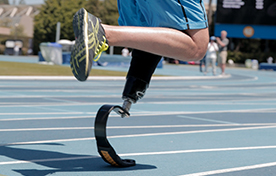What Happened to Your Leg Grandma?
– by Christina DiMartino
June DiMenna had suffered with diabetes for years when, after exhausting every treatment available, she had to have her left foot amputated. The procedure took place a week after she celebrated her 67th birthday.
“I quickly realized that there are many details to think about when one has a limb amputated,” she says. “The list stacks up over time – especially for people like me who have always been independent. But there was one thing that I didn’t anticipate, or even think about, that turned out to be a critical detail – how my grandchildren would understand and accept what had happened to me.”
DiMenna lives near her three daughters and four grandchildren who range in age from 3 to 10. “It isn’t unusual for me to see all of my grandchildren several times a week,” DiMenna says. “We have always spent ample and valuable time together. The thought that they wouldn’t understand – or that they might try to reject my affection – was devastating.”
Melinda Hinkle, who suffered a left below-knee amputation in an auto accident 20 years ago, has similar concerns. Hinkle’s son, daughter-in-law and two grandchildren, ages 2 and 4, live on the opposite side of the country from her, and between visits back and forth, she only sees the children about four times each year.
“They are growing up, and I know the time will come when they will begin to realize that their grandmother is different. I don’t know how to explain my amputation to them. I’m afraid it will frighten them, or they will think that the same thing will happen to them. It is time for me to have a plan prepared so I know how to answer the questions they will have. I want them to feel free to discuss my amputation with me any time they want.”
“Honesty is the best policy” applies when explaining an amputation to grandchildren. Stephen T. Wegener, PhD, is an associate professor, vice-chairman and chief of rehabilitation psychology at Johns Hopkins University School of Medicine, Physical Medicine and Rehabilitation division. His clinical activity is focused on providing psychological services to people with chronic illness or traumatic injuries including rheumatic disease, chronic pain, amputations and spinal cord injury. He says that children generally ask questions at an age when they can handle the answers. “Children are highly comparative and very observant,” Dr. Wegener says. “The answer to ‘When should you explain your amputation to your grandchild?’ is ‘When they begin asking.'”
Two issues are relevant to communicating the details of an amputation to a child, Dr. Wegener says. “One is the age of the child, and the other is how the child interacts with the amputation – and this can be quite different, depending on the circumstances. If the child has grown up familiar with your amputation, he or she may react differently than if you have an amputation procedure during the child’s youth. In the latter case, the child will of course realize that something has happened to make the grandparent different.”
This does not mean that the child will automatically be traumatized, says Dr. Wegener. Instead, he suggests some general guidelines to help the child gain acceptance and understanding. “A child’s response to the amputation event will mirror that of the person with the amputation,” he says. “Children will always respond to an adult’s emotional tone. How you respond will help guide the child’s response. First, give a response that is age-appropriate. Younger children require less specific details. Older children may require a more complex response to be satisfied with the answers you provide. It is best to anticipate the child’s questions. Depending on the child’s personality, you might consider opening the conversation yourself. Say to the child, ‘Let me tell you what happened to me.’ Or, ‘I had to have my leg removed so I could be healthy again.’ Having a good understanding of how the child will react is a good idea. Does he or she worry easily? The amputation may have been performed to improve your health, but it might make the child fearful that his or her leg will also be amputated or cause other fearful and worrisome thoughts.”
Children can say (and think) the strangest things – but they aren’t strange at all to them.
Children can say (and think) the strangest things – but they aren’t strange at all to them. Dr. Wegener says he has never heard of a child asking where the leg went after the doctor took it off – but it might be a good idea to be prepared for such a question. He says most children accept the explanation that the doctor disposed of the amputated limb somehow. But if a child does ask, merely tell him or her that the doctor took care of it and that you are no longer worried about where it is.
“When the conversation does begin with your grandchildren about your amputation, it is a good opportunity to discuss the differences between all people in the world,” Dr. Wegener says. “Take advantage of the time to talk about diversity and acceptance, and explain how this is just one of the many ways that people can be different.”
Children, Dr. Wegener suggests, are most concerned about their own security. If you have always spent valuable time with the child, he or she may worry that your amputation will change your relationship.
“The child may ask, ‘Does this mean that I can’t come to your house anymore, Grandpa?'” he says. “It is very important to communicate that things are going to be okay and that you will still spend valuable time with the child. Discuss these issues with the child’s parents and work together to ensure that you will continue to spend time with the child. You may also have to explain to the child why you cannot do some of the things you did together in the past. Perhaps you took regular walks after school. Suggest you begin playing computer games, engage in art and craft projects or spend more time reading together, for example.”
There is also the issue of the hospital and rehabilitation center, when and if they apply. If a child is fearful of hospitals, it is not advisable to force a confrontation.
“Don’t force the child to confront the limb loss either,” Dr. Wegener says. “Children will find their own time to deal with it. I have never seen a case where a child is traumatized or has serious anxiety or depression in such a situation, but if it happens, the parents should confer with a medical professional. It is best to not assume that there will be a problem, however. The majority of children find their own way – and time – and they deal with such things with surprising resilience.”
Teens who are sensitive to peer pressure may have a different type of difficulty dealing with a grandparent’s amputation, Dr. Wegener says.
“Adolescents may feel somewhat embarrassed, and may even try to avoid the grandparent,” he says. “It is best for the person with the amputation to engage in a conversation directly with the child – rather than allowing a parent to do it. Limb loss can also be an opportunity for teens to learn about change. As a grandparent, you can be a mentor for such a learning experience.”
There is a caveat to explaining an amputation to a grandchild who doesn’t ask about it, however. Some children are timid and shy, Dr. Wegener says, and they may need some prompting or intervention to get them engaged in a conversation.
“A parent may ask a child with this type of personality, ‘How do you think your grandfather is doing? Are you worried about him?'” Dr. Wegener says. “Once the child acknowledges the amputation, then you can begin offering explanations.”
The most important thing to remember is that children bounce back quickly. Once they understand why the amputation was necessary and how it will change the circumstances of their lives, they will likely move on and accept the “new normal.”
Disclaimer: The following information is provided and owned by the Amputation Coalition of America and was previously published on the website http://www.amputee-coalition.org or the Coalitions Newsletter, inMotion.








